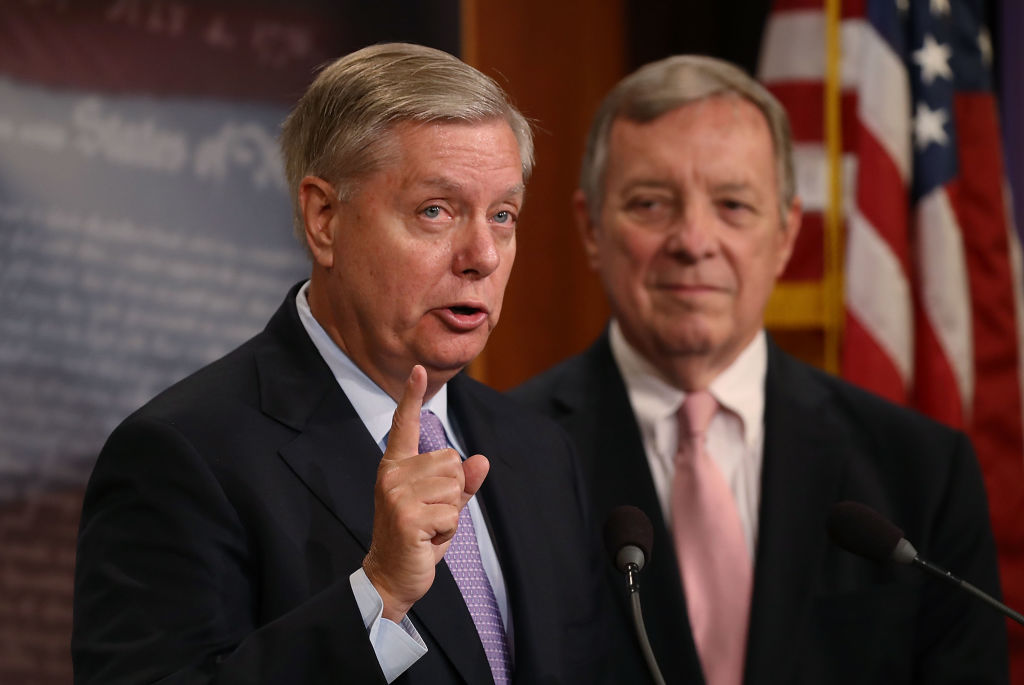Protecting DREAMers is wildly popular, but Trump rejected one of the few bipartisan plans


A free daily email with the biggest news stories of the day – and the best features from TheWeek.com
You are now subscribed
Your newsletter sign-up was successful
Sens. Lindsey Graham (R-S.C.) and Dick Durbin (D-Ill.) believed they secured a meeting with President Trump on Thursday to go over their bipartisan immigration plan with the four other senators negotiating the deal, two Democrats and two Republicans. But when they arrived, immigration hardliners like Sen. Tom Cotton (R-Ark.) and Rep. Bob Goodlatte (R-Va.) were in the Oval Office, because White House adviser Stephen Miller "was concerned there could be a deal proposed that was too liberal and made sure conservative lawmakers were present," The Washington Post reports.
"Trump had seemed amenable to a deal earlier in the day during phone calls with lawmakers," the Post says, citing aides, but he "shifted his position in the meeting and did not seem interested in the bipartisan compromise." Most infamously, Trump rejected the idea of protecting immigrants from Haiti, El Salvador, and several African countries, calling them "shithole countries" and specifically nixing Haiti. "Why do we need more Haitians?" Trump reportedly said. "Take them out." The meeting got "salty" on all sides, a White House official told the Post. "It did not go well."
One of the main pillars of the bipartisan plan, and its impetus, was a replacement for the Deferred Action for Childhood Arrivals program. The plan offers a 12-year path to citizenship for DREAMers, young immigrants brought to the U.S. illegally when they were children. Protecting DREAMers is really popular — 86 percent of U.S. voters, including 76 percent of Republicans, want the DREAMers to stay in the U.S., according to a new Quinnipiac poll.
The Week
Escape your echo chamber. Get the facts behind the news, plus analysis from multiple perspectives.

Sign up for The Week's Free Newsletters
From our morning news briefing to a weekly Good News Newsletter, get the best of The Week delivered directly to your inbox.
From our morning news briefing to a weekly Good News Newsletter, get the best of The Week delivered directly to your inbox.
Other parts of the bipartisan plan are more contentions, with liberals opposed to the $1.6 billion for planning and building Trump's border wall and conservatives opposed to any path to citizenship. It "has been viewed as the legislation that has the best chance of success on Capitol Hill," Politico reports, though another bipartisan group of four top lawmakers is focusing more narrowly on the DREAMers issue.
A free daily email with the biggest news stories of the day – and the best features from TheWeek.com
Peter has worked as a news and culture writer and editor at The Week since the site's launch in 2008. He covers politics, world affairs, religion and cultural currents. His journalism career began as a copy editor at a financial newswire and has included editorial positions at The New York Times Magazine, Facts on File, and Oregon State University.
-
 The environmental cost of GLP-1s
The environmental cost of GLP-1sThe explainer Producing the drugs is a dirty process
-
 Greenland’s capital becomes ground zero for the country’s diplomatic straits
Greenland’s capital becomes ground zero for the country’s diplomatic straitsIN THE SPOTLIGHT A flurry of new consular activity in Nuuk shows how important Greenland has become to Europeans’ anxiety about American imperialism
-
 ‘This is something that happens all too often’
‘This is something that happens all too often’Instant Opinion Opinion, comment and editorials of the day
-
 TikTok secures deal to remain in US
TikTok secures deal to remain in USSpeed Read ByteDance will form a US version of the popular video-sharing platform
-
 Unemployment rate ticks up amid fall job losses
Unemployment rate ticks up amid fall job lossesSpeed Read Data released by the Commerce Department indicates ‘one of the weakest American labor markets in years’
-
 US mints final penny after 232-year run
US mints final penny after 232-year runSpeed Read Production of the one-cent coin has ended
-
 Warner Bros. explores sale amid Paramount bids
Warner Bros. explores sale amid Paramount bidsSpeed Read The media giant, home to HBO and DC Studios, has received interest from multiple buying parties
-
 Gold tops $4K per ounce, signaling financial unease
Gold tops $4K per ounce, signaling financial uneaseSpeed Read Investors are worried about President Donald Trump’s trade war
-
 Electronic Arts to go private in record $55B deal
Electronic Arts to go private in record $55B dealspeed read The video game giant is behind ‘The Sims’ and ‘Madden NFL’
-
 New York court tosses Trump's $500M fraud fine
New York court tosses Trump's $500M fraud fineSpeed Read A divided appeals court threw out a hefty penalty against President Trump for fraudulently inflating his wealth
-
 Trump said to seek government stake in Intel
Trump said to seek government stake in IntelSpeed Read The president and Intel CEO Lip-Bu Tan reportedly discussed the proposal at a recent meeting
